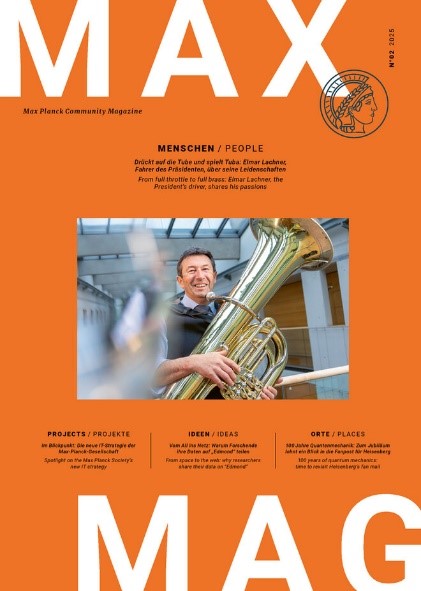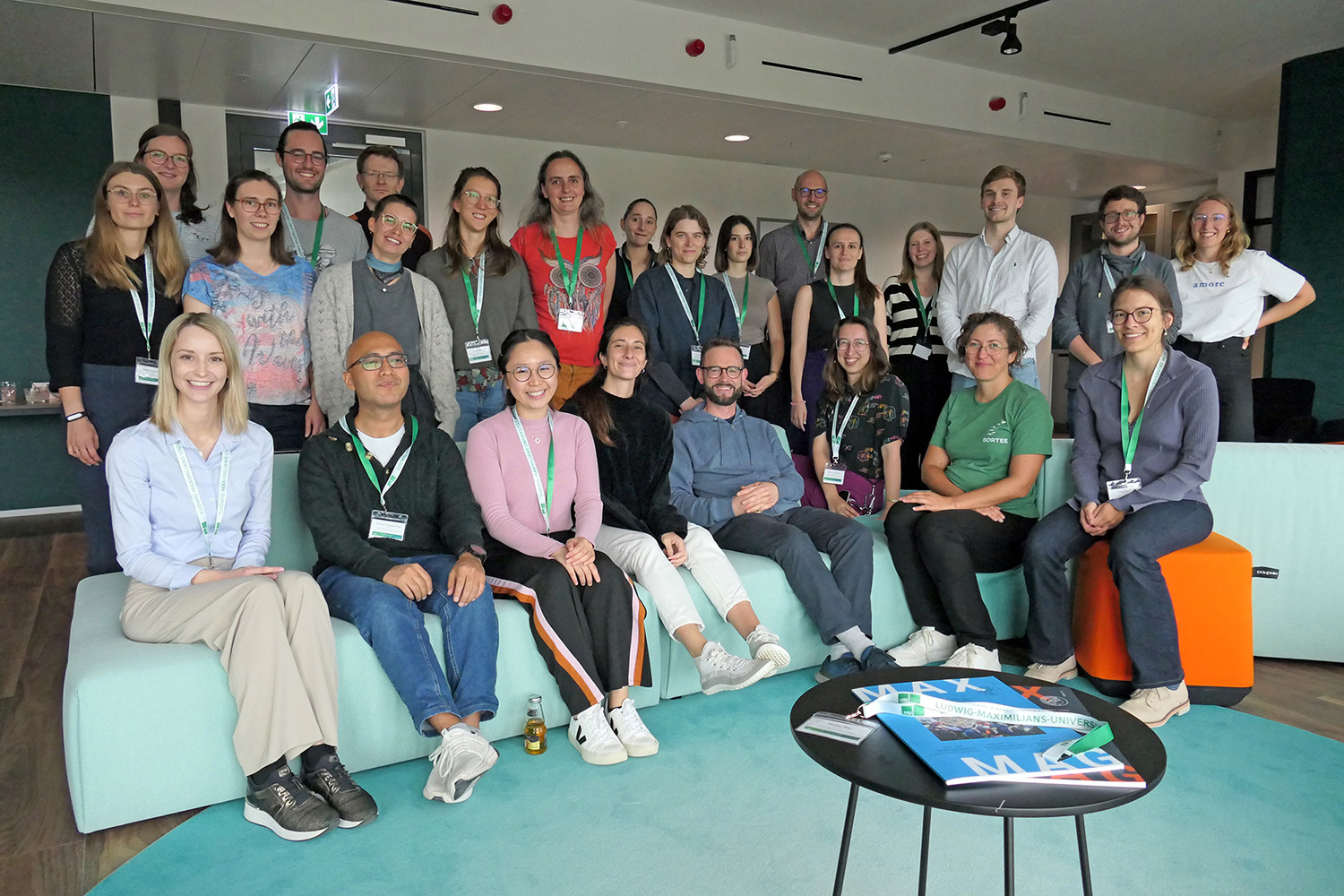News
News
Please find older news releases in our News Archive.
-
MPG’s Open Research Data Repository Edmond Featured in MAX MAG
Edmond, the Max Planck Society's (MPG) open research data repository, is featured in a detailed article in MAX MAG, the MPG's community magazine.
The article provides an insightful look at Edmond's mission to make high-quality, open research data accessible to the global scientific community. By providing researchers with easy access to a wealth of data, Edmond plays a crucial role in promoting transparency, reproducibility, and collaborative research within the MPG and beyond.
The article in MAX not only highlights Edmond's features, but also recognizes its community-oriented approach to data sharing. It underscores how important platforms such as Edmond are for promoting interdisciplinary collaboration for research and breaking down barriers to access to scientific data.
Edmond was developed by staff at the Max Planck Digital Library (MPDL) and has been operated by MPDL since its inception in 2014.
More info:
Article on Edmond in MAX MAG -
Digital Change Symposium 2025
From March 31 to April 2, the Digital Change Symposium 2025 on the future of science management in the MPG took place at Kloster Seeon. The event, organized by the MPDL, brought together research coordinators, science communicators, and experts from research to discuss the use of AI in science, open science, science communication, decentralized science, and other digital opportunities.
On the arrival day of the symposium, an introduction round took place, featuring numerous retrospectives on previous Digital Change Symposia and insights into the working methods of experts in public relations and research coordinators. The symposium not only offered exciting contributions on topics such as the communication strategy of the Max Planck Society's institutes, it also included an adventurous knowledge hike around Lake Seeon and a round of scientific matchmaking, where research coordinators and public relations personnel were networked according to their areas of interest.
With a focus on innovations and trends related to digital transformation, the MPDL aims to stimulate discussion and contribute to jointly leveraging the opportunities of digital change for research and science. Located on a peninsula in Lake Seeon, Kloster Seeon provided the perfect atmosphere for knowledge exchange. The event was well-received and highlighted the growing demand within the MPG for the topics addressed. The MPDL thanks all participants and looks forward to seeing them again with new exciting topics!
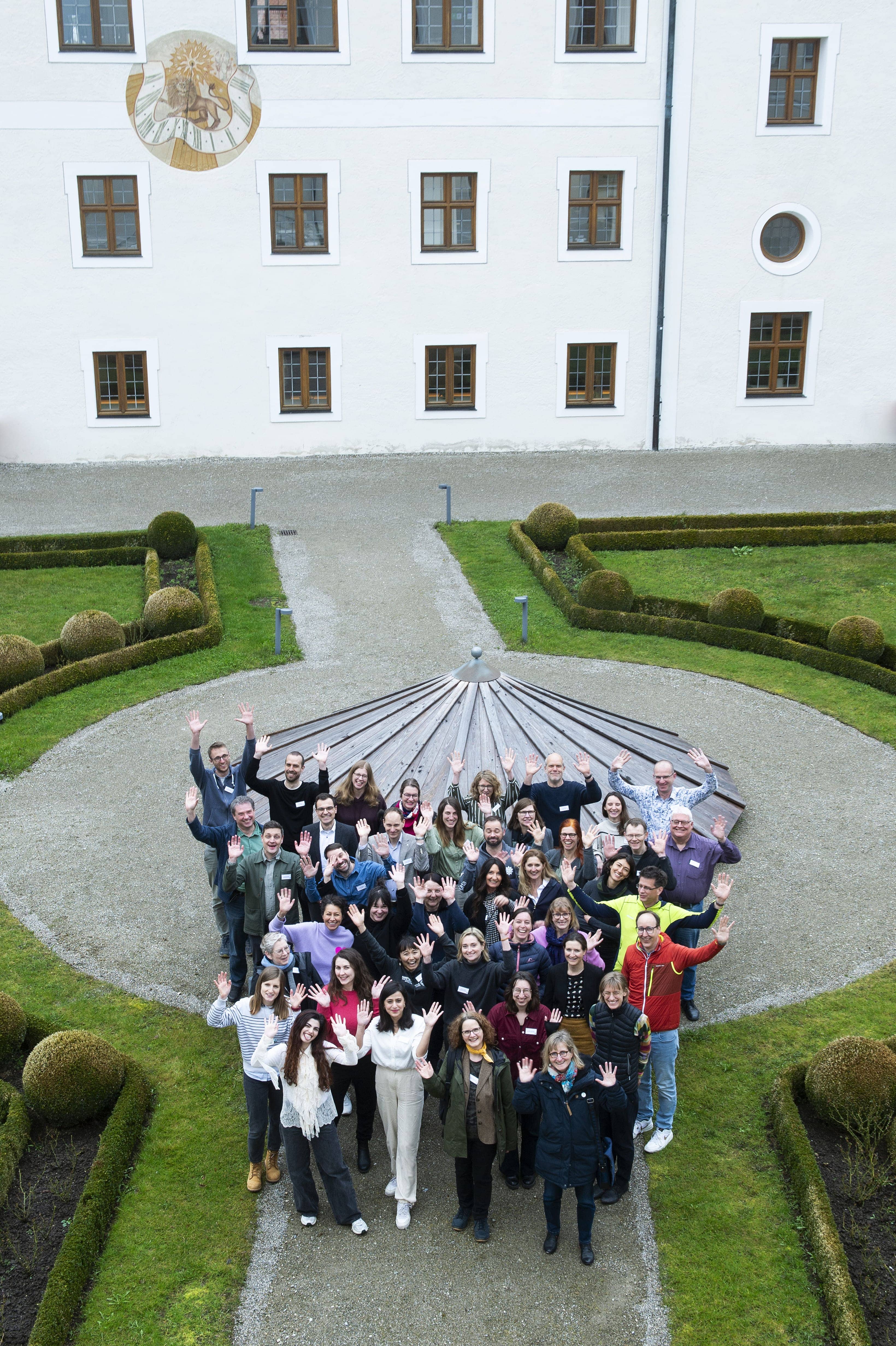
-
MPDL supports KOALA’s Diamond Open Access journal bundle for Computer Science & Mathematics
The Max Planck Digital Library is happy to announce its contribution to TIB’s KOALA bundle for computer science and mathematics from 2025 to 2027:
Journal of Universal Computer Science – Covering all research areas in computer science
Electronic Transactions on Numerical Analysis – Advancing numerical analysis and scientific computing
Journal de l'École Polytechnique – Publishing top-tier research in applied and fundamental mathematicsThrough this sponsorship, MPDL strengthens the sustainability of Diamond Open Access journals important to Max Planck researchers.
In supporting KOALA, the MPDL also demonstrates its continued commitment to maximizing the visibility of Max Planck authors’ research through open access, wherever they choose to publish, while contributing to a more diverse scholarly publishing system, in full alignment with the goals of the Berlin Declaration on Open Access and the Max Planck Society’s Open Access 2020 Initiative.
More Info:
-
Llama 3.3-70B and ChatGPT o3-mini Now Available in Minerva Messenger
The Max Planck Digital Library, in collaboration with GWDG, has integrated Llama 3.3-70B into Minerva Messenger. Hosted and managed by GWDG, this AI-powered addition enhances research, communication, and productivity for Max Planck users, allowing seamless interaction within their workflows.
Llama 3.3-70B is an AI model designed for complex reasoning, natural language understanding, and efficient problem-solving. It assists in research, text generation, programming, language translation, and brainstorming. Optimized for high-quality responses across various domains, it is a valuable tool for scientists, researchers, and professionals.
Users can engage with Llama 3.3-70B through direct messages and private channels. The integration ensures a streamlined experience with threaded responses that maintain context in conversations. The model’s instruction-tuned capabilities enhance user interactions by providing precise, context-aware answers.
In addition, it is now also possible to use ChatGPT o3-mini in Minerva Messenger to further increase the functionality and flexibility of the platform. ChatGPT o3-mini offers additional possibilities for interaction and supports users in a variety of tasks, from creative text creation to analysing complex data. The combination of Llama 3.3-70B and ChatGPT o3-mini in Minerva Messenger ensures that the Max Planck community has access to the most advanced AI tools to efficiently achieve its research and communication goals.
This initiative aligns with MPDL’s commitment to leveraging cutting-edge AI technologies for scientific and administrative applications. Whether refining text, troubleshooting code, or generating insights, both chatbots allow workflows that are more efficient.
Users seeking to explore additional AI models or API access can refer to Knowledge Base documentation. For support, the Minerva Messenger team is available to assist: This email address is being protected from spambots. You need JavaScript enabled to view it.
Experience AI-powered assistance within Minerva Messenger and enhance your workflow today!
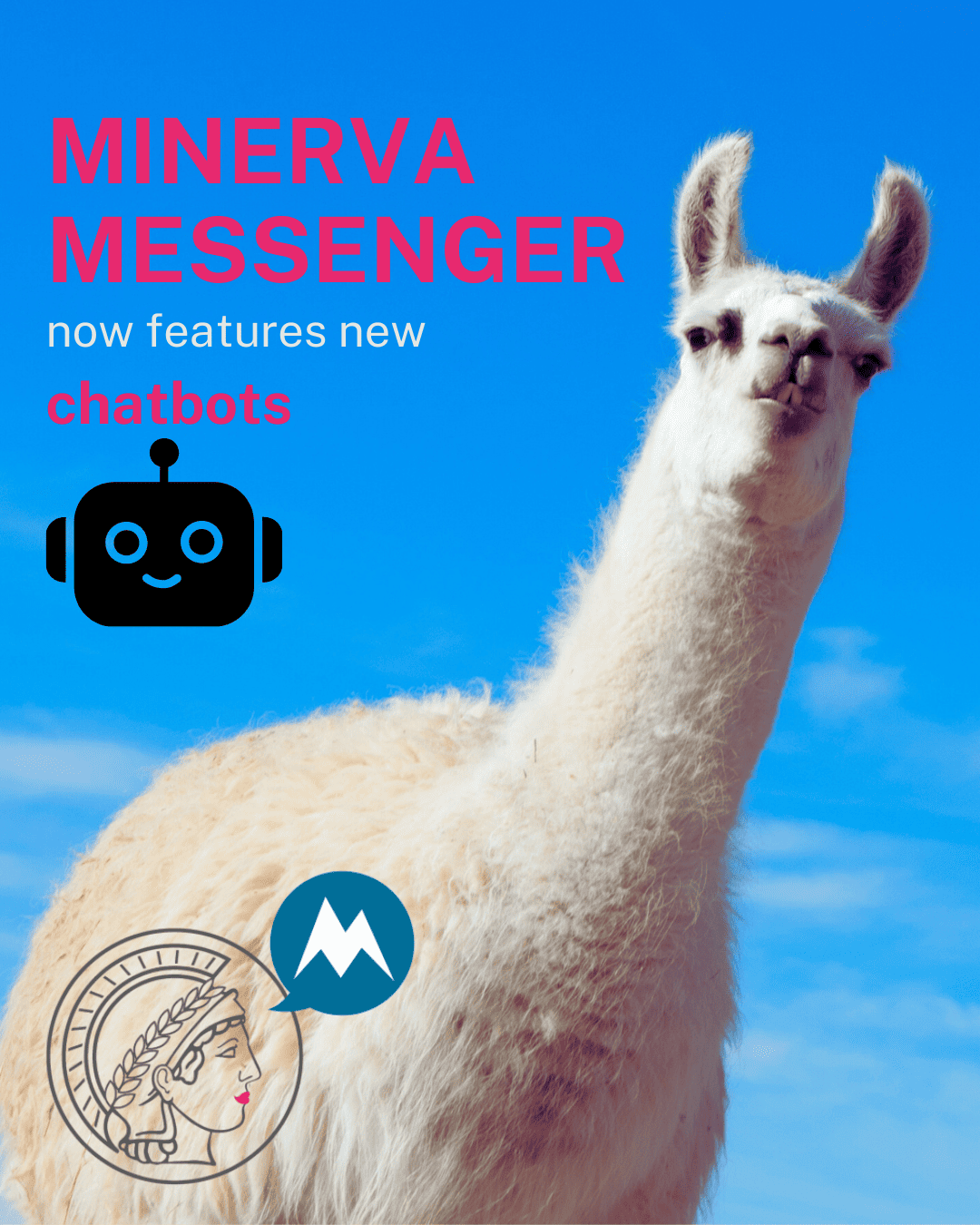
-
Edmond celebrates milestone: 1000 datasets online
The Max Planck Society's Edmond research data platform has reached a significant milestone: 1000 datasets from a wide range of scientific disciplines are now freely available on edmond.mpg.de. The publication of research data on so-called repositories - such as Edmond - offers the scientific community the opportunity to establish data as permanently citable research objects.
Edmond was launched in 2014, when researchers published the first seven datasets. Since then, the repository has grown steadily, with 263 datasets uploaded in 2024. The size of the uploaded files varies greatly, from a few bytes to over 100 gigabytes.
The content could not be more diverse either: You can find videos of honey bees (Videos for honey bee lifetime tracking data), but also software code (Balsac download package) and time series of visibility measurements in the Amazon rainforest (Fog dataset at ATTO). A total of around 195,000 individual files are contained in the 1000 Edmond datasets.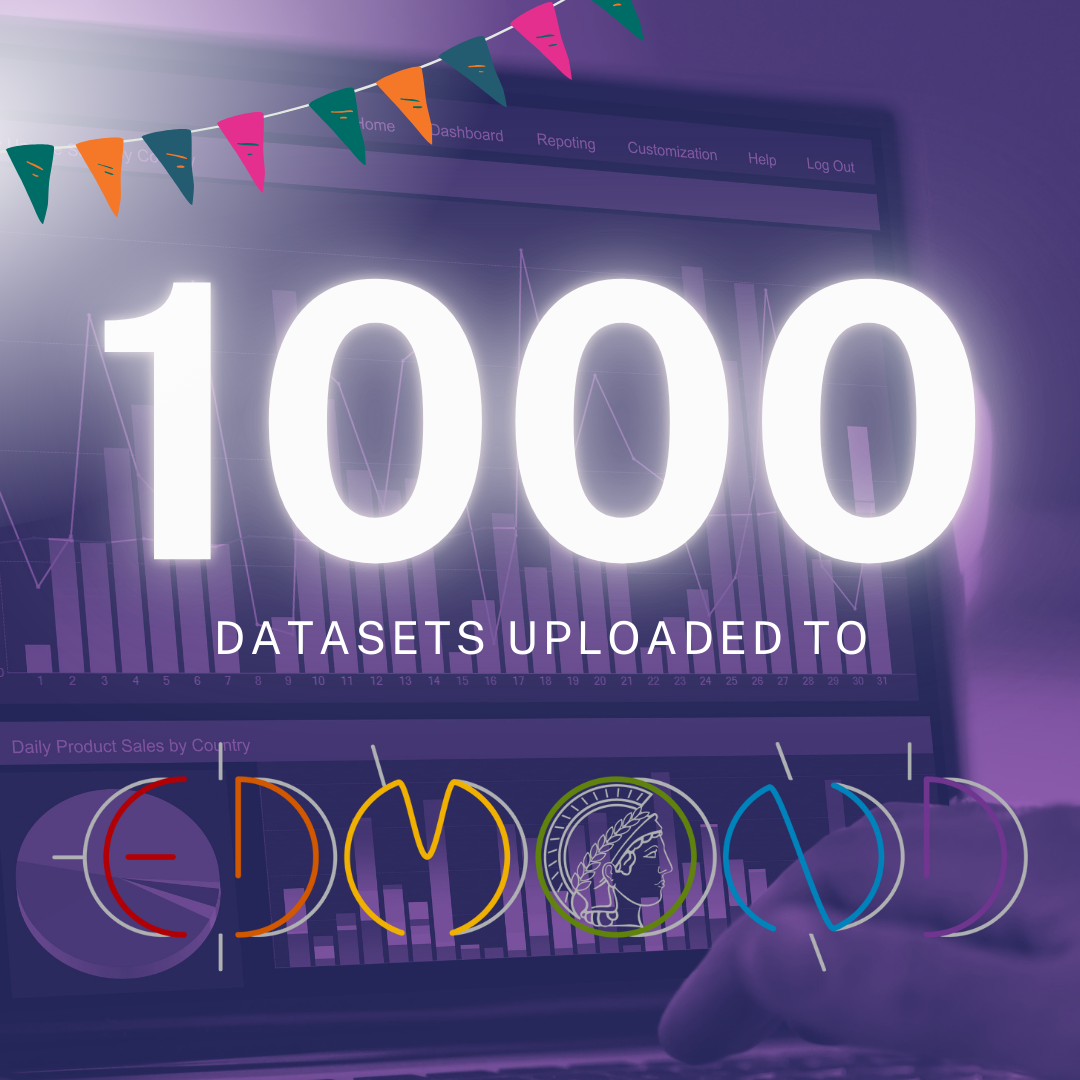
Edmond offers a variety of functions to facilitate the publication and findability of research data:- The assignment of DOI numbers (Digital Object Identifiers) for each published dataset.
- The ability to store multiple files in one dataset and support for different file formats
- The versioning of datasets to document changes
Edmond has also been awarded the CoreTrustSeal. The seal of approval stands for the trustworthiness of data repositories. Technical standards such as regular backups play a role here, as do organizational standards (long-term financing) and data quality (curation and metadata).
By reaching 1000 datasets on Edmond, the scientists of the Max Planck Society are sending a clear signal about the importance of openly accessible data in science.The Max Planck Institute of Microstructure Physics contributed the 1000th dataset: "Momentum resolved fingerprint of Mottness in layer dimerized Nb3Br8"
More info:
Edmond – the Open Research Data Repository of the Max Planck Society
-
17th Berlin Open Access Conference: Moving OA Forward
The OA2020 Initiative, coordinated by the Max Planck Digital Library (MPDL) on behalf of the Max Planck Society, will host the 17th Berlin Open Access Conference (B17) on February 5-6, 2025 at Harnack House, Berlin. The conference is entitled "Moving OA Forward: From Transformation to Collective Responsibility".

Continuing the Max Planck Society’s leadership in making research openly accessible for the benefit of science and society, B17 will bring together negotiators and institutional leaders from over 40 countries to chart the next phase of the global open access transition in science communication. Thanks to MPDL’s leadership, over 90% of research from its institutes is now published openly, demonstrating open access negotiations as a viable open access pathway for the global community. Yet, while transformative open access agreements negotiated by institutions around the world have unlocked millions of research articles, many challenges remain. In particular, ensuring that all authors, regardless of their financial background, can publish based solely on the quality of their work—without encountering financial barriers—is a critical task. In an era where AI technologies are rapidly reshaping science communication, preserving author rights and ensuring publishing integrity also remains a core challenge.
Co-chaired by Prof. Dr. Ulrich Pöschl (Max Planck Institute for Chemistry, Mainz) and Prof. Dr. Gerard Meijer (Fritz Haber Institute, Berlin), B17 will provide a platform for negotiators to align around shared principles and priorities, defining concrete actions that will drive the open access movement forward and strengthening foundations for a truly open science ecosystem.
Stay tuned for the conference outcomes, shared globally with the research community.
More Info:
17th Berlin Open Access Conference Website
-
Open Science Ambassadors Meeting 2024
This year's annual Open Science Ambassadors Meeting took place at the Harnack House in Berlin from November 6-7, 2024, bringing together experts and enthusiasts from the scientific community to discuss the latest developments and best practices in Open Science.
The two-day meeting focused on several key topics, including the increasing importance of digitality in science, the current status of Open Science in the Max Planck Society, and the challenges and opportunities of implementing FAIR (Findable, Accessible, Interoperable, and Reusable) research data management.
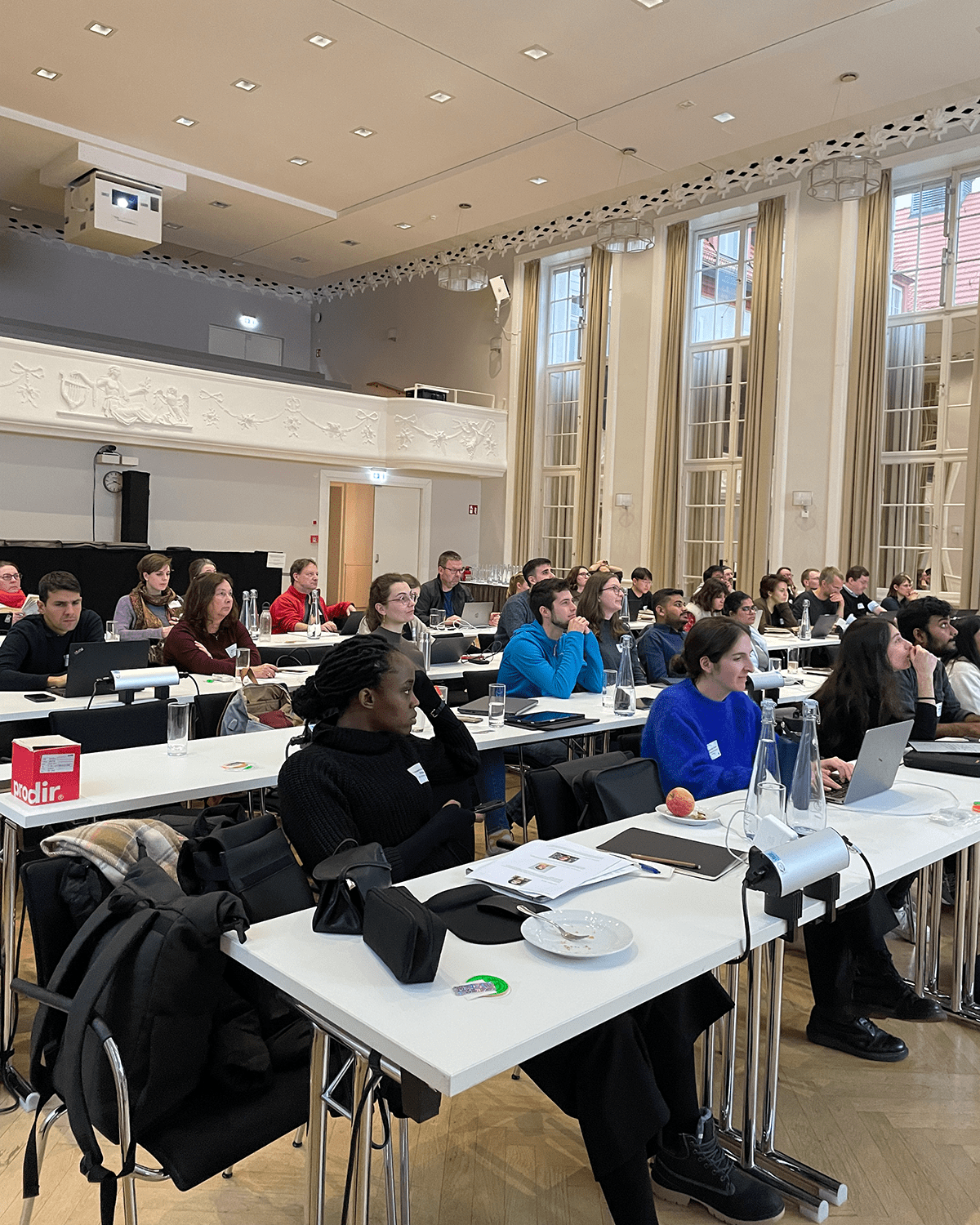
The meeting featured a range of workshops and talks, including a session on "Research Software Engineering for Reproducible High Performance Scientific Computing," which included a lively discussion on questions and challenges regarding reproducible research software engineering.
The Open Science Ambassadors (OSA) also presented a talk on "Open Science in the Max Planck Society," highlighting the Society's commitment to Open Science and our efforts to promote a culture of openness and collaboration among the researchers.
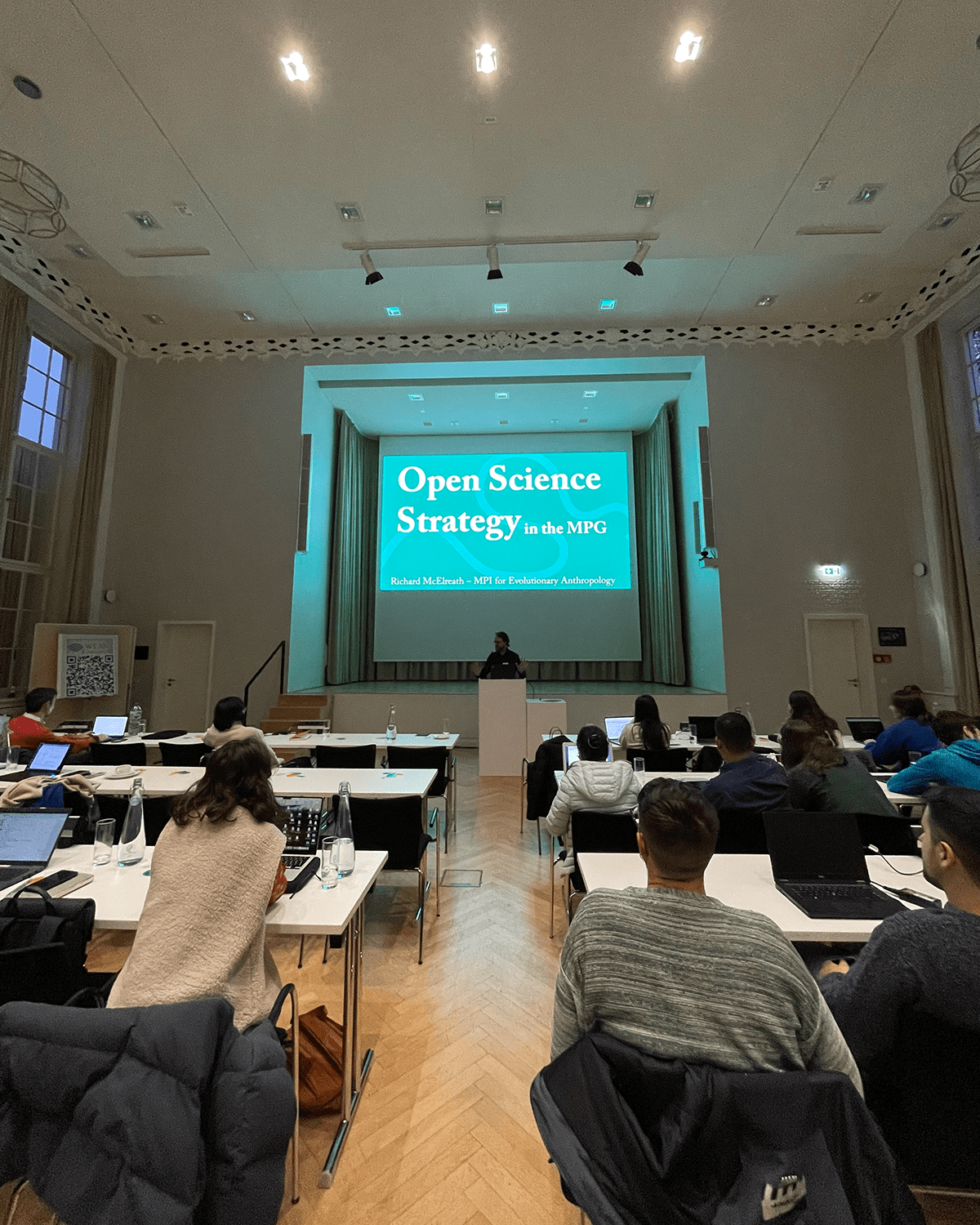
In a unique and collaborative effort, the OSA organized a workshop on "Speed Drafting of Policy Language," where participants worked together to draft policy language on Open Science. This hands-on approach allowed participants to engage with the policy-making process and to contribute their expertise and insights to the development of Open Science policies.
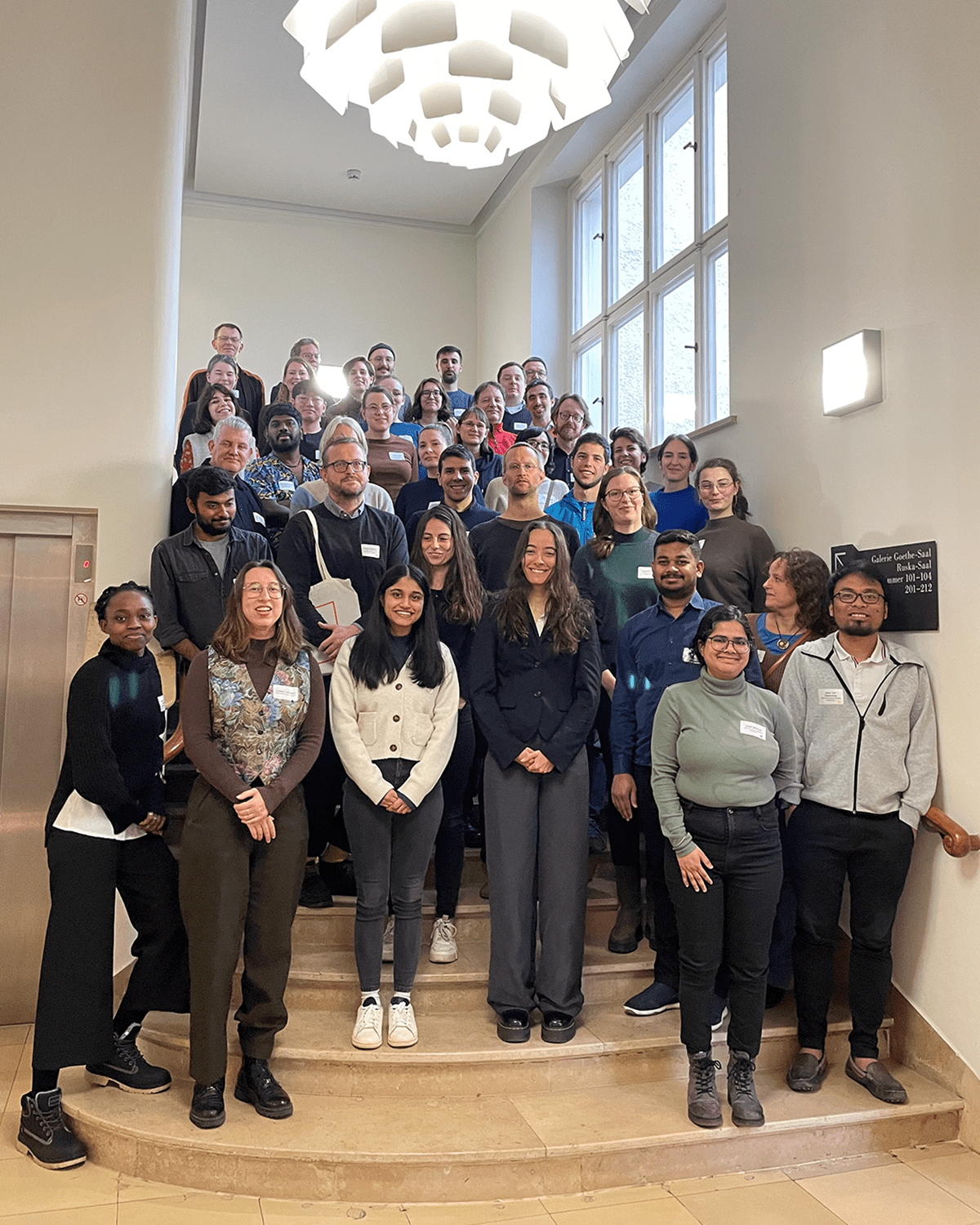
The Open Science Ambassadors Meeting was a valuable opportunity for MPG scientists and staff to come together and discuss the latest developments and best practices in Open Science. The meeting highlighted the importance of collaboration, innovation, and openness in advancing scientific research and promoting a more inclusive and equitable scientific community.
Join us for an online follow-up meeting on February 12, from 3-5 PM, as our community reconvenes. The Open Science Ambassadors will present their achievements and future plans at their respective institutes. It is also a chance for everyone to join who could not attend the Berlin event in November. We warmly welcome all contributions and are eager to learn about the latest Open Science developments at the MPIs.
More Info:
Open Science Ambassadors Meeting 2024
-
Minerva Messenger now features MPG Single Sign-On (SSO)
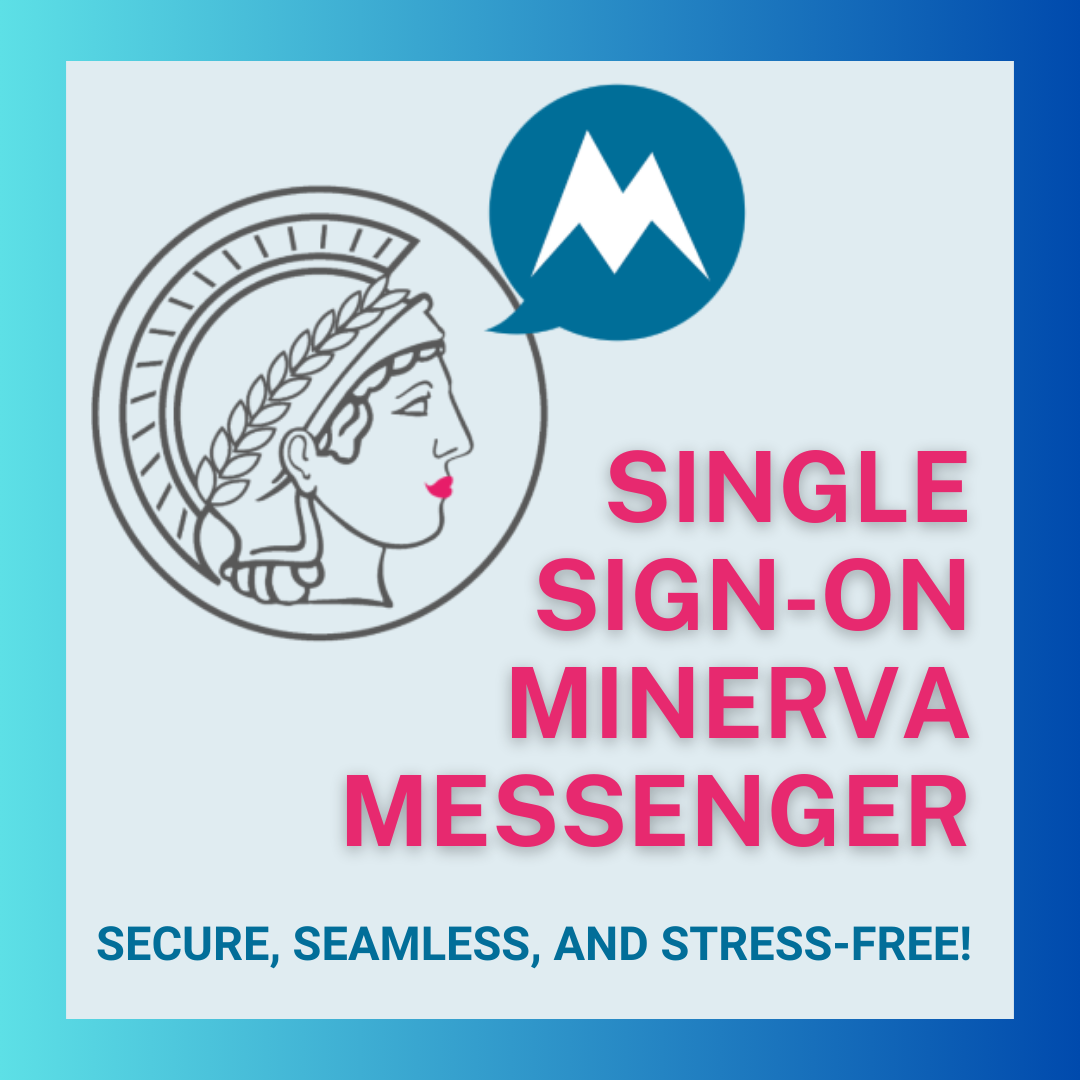 We are excited to announce that Minerva Messenger is now part of the MPG Single Sign-On (SSO) ecosystem!
We are excited to announce that Minerva Messenger is now part of the MPG Single Sign-On (SSO) ecosystem!This enhancement is a step forward in simplifying secure access for Max Planck Society users, boosting the usability and efficiency of MPDL's messenger tool.
The MPG SSO integration enables MPG employees to log in to Minerva Messenger using their institutional credentials, eliminating the need to manage separate accounts or passwords. This not only saves time but also ensures a seamless and secure experience across the platform, fostering smoother collaboration within the MPG community.
Minerva Messenger continues to serve as a central hub for effective and efficient communication among MPG researchers, staff, and external collaborators.The addition of MPG SSO further strengthens the Messenger's role as an indispensable tool for collaboration.
Ready to try it? Log in now using MPG SSO and enjoy smoother access to Minerva Messenger!More info:
Read the full guide in our Minerva Messenger knowledge base. -
MPDL sponsors OA Switchboard integration for Open Journal Systems
OA Switchboard has announced a plugin for PKP's Open Journal Systems (OJS), designed to enhance visibility and streamline reporting for diamond open access journals. The development has been made possible by funding from the Max Planck Digital Library.
A community-led initiative, OA Switchboard simplifies information sharing across different stakeholders about open access publications across the publication journey. This new plugin will allow publishers using OJS to seamlessly connect to OA Switchboard, streamlining reporting to research funders, libraries, and consortia, and making it easier to share OA output and metadata with key stakeholders. This tool will also provide publishers with improved management information and insights into their portfolio and stakeholder relationships.
Ádám Dér, Head of Scientific Information Services at the MPDL, says: "The MPDL is proud to contribute to the development of open infrastructure that facilitates the streamlining of processes in the ever-complex world of open academic publishing. In line with the Max Planck Society's vision of barrier-free access to scientific knowledge, we remain dedicated to creating the conditions for open scholarly processes for our researchers and the global scientific community. We're honored to support the creation of a plug-in that enables standardized OA reporting for OJS publishers via the OA Switchboard, which also elevates their position and visibility among libraries, consortia, and funders."
For more details, please see the full announcement here
-
25 years of Scientific Information Provision
A tale of service excellence, breaking paywalls and global leadership:
MPG’s Scientific Information Provision celebrates 25 years of supporting research
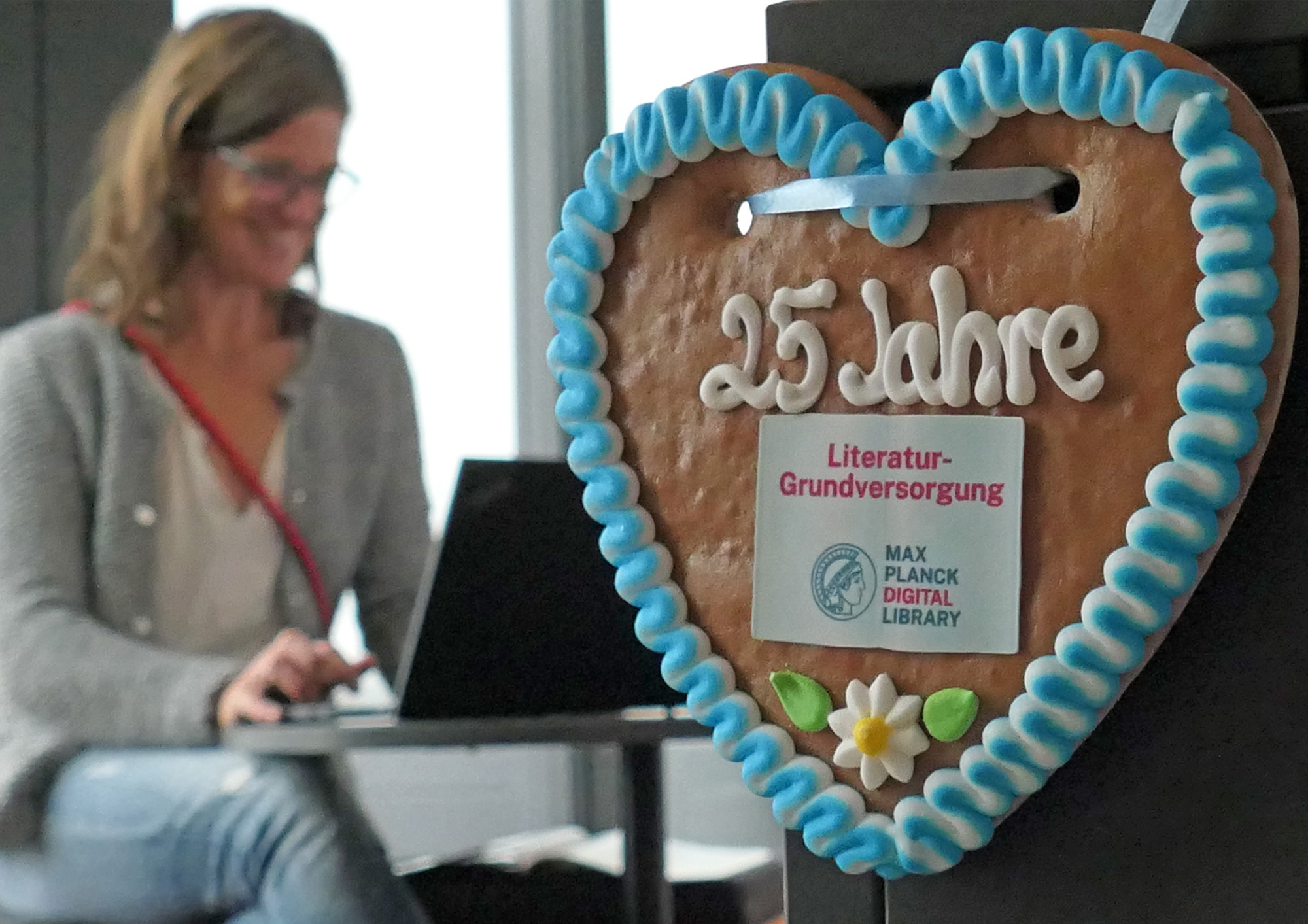 The Max Planck Society is thrilled to mark the 25th anniversary of its Scientific Information Provision ("Literatur-Grundversorgung"), the core service provided by the Max Planck Digital Library that gives our researchers near-universal access to the literature they need to advance their work, while ensuring their results reach a wide audience.
The Max Planck Society is thrilled to mark the 25th anniversary of its Scientific Information Provision ("Literatur-Grundversorgung"), the core service provided by the Max Planck Digital Library that gives our researchers near-universal access to the literature they need to advance their work, while ensuring their results reach a wide audience.Imagine coming home after a long day, flipping a switch, and instantly having light. You likely don’t think about all the infrastructure behind it—the work that goes into making something so basic and necessary available at your fingertips. For researchers, access to knowledge is just as vital. If you’ve ever been blocked by a paywall when trying to access a research article or textbook, you’ll understand how essential easy access to scientific works can be.
Twenty-five years ago, at the onset of the digital age, the Max Planck Society saw the potential of a centralized infrastructure to deliver universal information services for all of the institutes in an efficient and cost-effective way that, in close collaboration with the local libraries, could give the best possible support to our researchers. This visionary idea was the origin of what we call the Scientific Information Provision (or “Literatur-Grundversorgung”, in German)—a strategic service aimed at ensuring that all our scientists have access to the literature they need to thrive. It transformed the way we work, with an impact that has reached far beyond the walls of our institutes.
What began as an innovative concept has grown into one of the world’s leading research libraries. Today, the Max Planck Digital Library, which upon its creation became responsible for the management and development of the provision, handles more than 200 licenses that ensure seamless access to over 17,000 peer-reviewed journals and 900,000 e-books. This success is thanks to a devoted team that understands the needs of our researchers and librarians and works closely with service providers to deliver the tools and support they need, as well as the Max Planck institutes, who dedicated a portion of their budgets to launch this initiative.
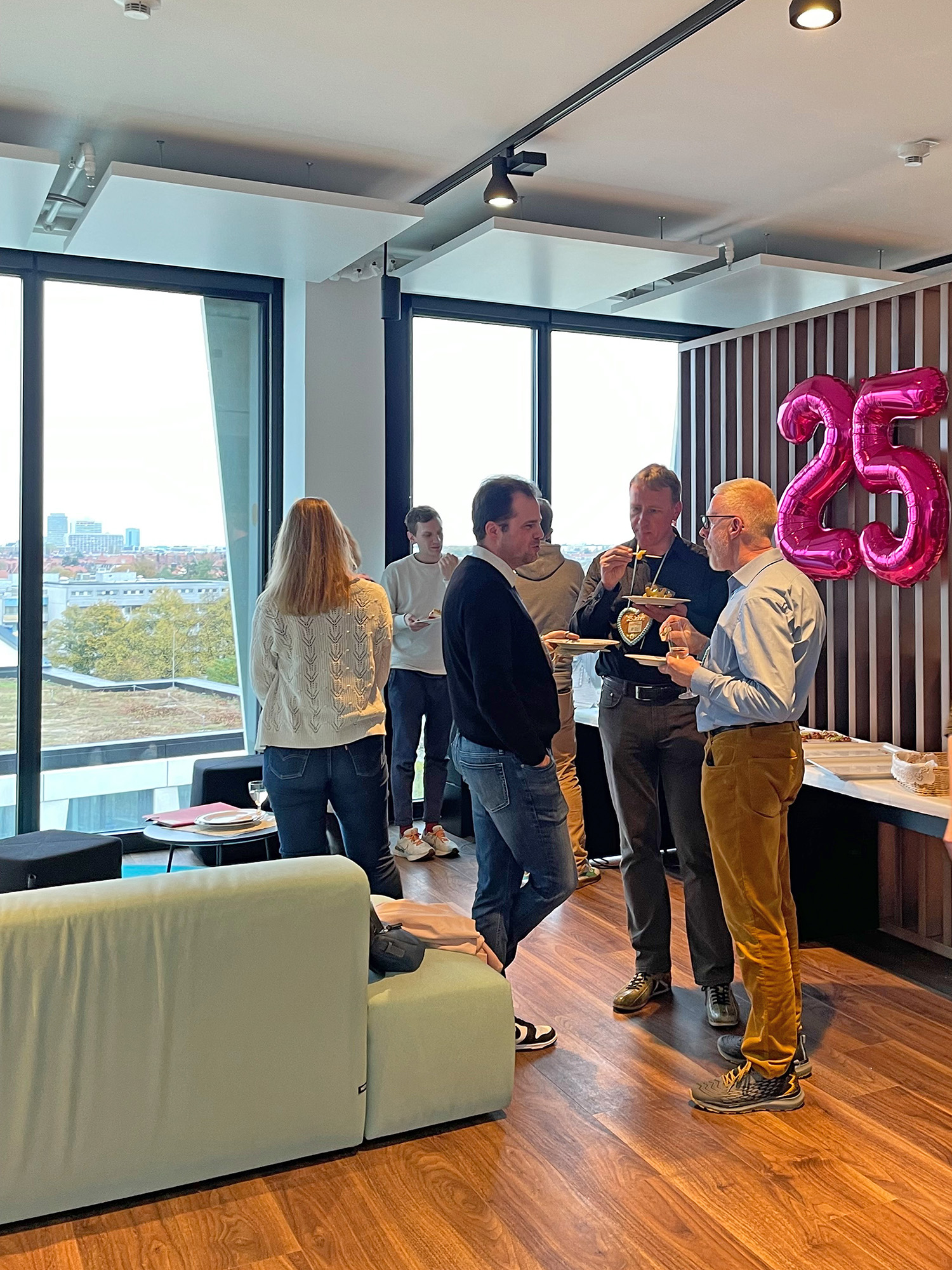 But the significance of the Scientific Information Provision extends beyond mere convenience. It reflects a larger mission: not just to access existing knowledge, but to amplify the research produced by the Max Planck Society and make it accessible to as many people as possible. This vision aligns with the goals of the Berlin Declaration on Open Access, of which the Max Planck Society was a key signatory and advocate. Through the global push for open scholarship, libraries like ours have become not just custodians of information but champions of global knowledge-sharing, ensuring that research is freely available and highly visible.
But the significance of the Scientific Information Provision extends beyond mere convenience. It reflects a larger mission: not just to access existing knowledge, but to amplify the research produced by the Max Planck Society and make it accessible to as many people as possible. This vision aligns with the goals of the Berlin Declaration on Open Access, of which the Max Planck Society was a key signatory and advocate. Through the global push for open scholarship, libraries like ours have become not just custodians of information but champions of global knowledge-sharing, ensuring that research is freely available and highly visible.Achieving universal access to scientific knowledge requires global alignment and cooperation. The Max Planck Society has been a leader in this effort, with MPDL taking on an important position that has influenced and inspired peers around the world in the common goal of open scholarship. In Germany, we have been key contributors to national open access agreements (the groundbreaking DEAL agreements). And through its coordination of the global initiatives OA2020 and ESAC, the MPDL has shaped the evolution of scholarly publishing, creating strategic and practical frameworks to make open access a reality, and earning recognition for its significant impact in fostering a better world.
As we celebrate this 25th anniversary, we reflect with pride on all we've accomplished for our researchers and the wider academic community. Just as the infrastructure behind a light switch makes life easier without us even thinking about it, our work has quietly empowered research and discovery. We look ahead, more committed than ever to leading the charge toward open scholarship and embracing the challenges that will continue to power a brighter, more accessible future for science.
If you have any questions or feedback about the MPG Scientific Information Provision, we’d love to hear from you! Feel free to reach out to us at This email address is being protected from spambots. You need JavaScript enabled to view it.
-
New Project Announcement: SciBoost – Decentral Continuous Publication
MPDL is excited to announce a groundbreaking collaboration with the University College London (UCL) Department of Computer Science. The SciBoost – Decentral Continuous Publication project aims to revolutionize how research findings are shared and accessed.
SciBoost is designed to enhance openness in the scientific community by providing a transparent, accountable, and decentralized system. This innovative platform will ensure that all research findings, including minor results, negative results, publications, and technology transfers, are accounted for and accessible. The continuous updates and corrections facilitated by SciBoost will ensure that research and credit attribution communication remains accurate, fostering transparency and integrity in scientific research.
Within the SciBoost project, UCL and MPDL will focus on creating a decentralized, continuous process that integrates: data harvesting, modeling, discovery, collaboration, publication, and knowledge transfer of research data. This comprehensive approach aims to streamline the research process and make scientific data more accessible and reliable. The collaboration manifests the first milestone in combining traditional and decentralized science methods with two renowned research institutions, MPG and UCL.
"I am thrilled to explore the potential impact of what we call continuous publishing. This concept allows research findings to be shared and published as they emerge. Publications can evolve, change, and diverge in different directions, reflecting the dynamic nature of the research process, which is not linear and doesn't conclude with a single publication. The idea of continuous publishing aims to capture exactly this essence." Says Friederike Kleinfercher, deputy general manager of the Max Planck Digital Library. "It is equally important to involve existing publishers and to complement the current processes in academic publishing, rather than introducing new, parallel processes that would complicate scholarly work," adds Tomaso Aste, Professor of Complexity Science at UCL.
We look forward to the innovative solutions and advancements from this collaboration. Stay tuned for more updates on the SciBoost project!
-
Leadnet Symposium 2024
On September 16 and 17, the MPDL participated in the 2024 LeadNet Symposium, which took place at the Harnack House in Berlin.
The LeadNet Symposium is an annual networking event for scientists with leadership responsibilities within the Max Planck Society. It serves as a platform for discussing scientific and organizational topics and promotes interaction between research group leaders. This year, around 50 group leaders attended the event to share their scientific and technological insights, work as well as common career and administrative challenges.
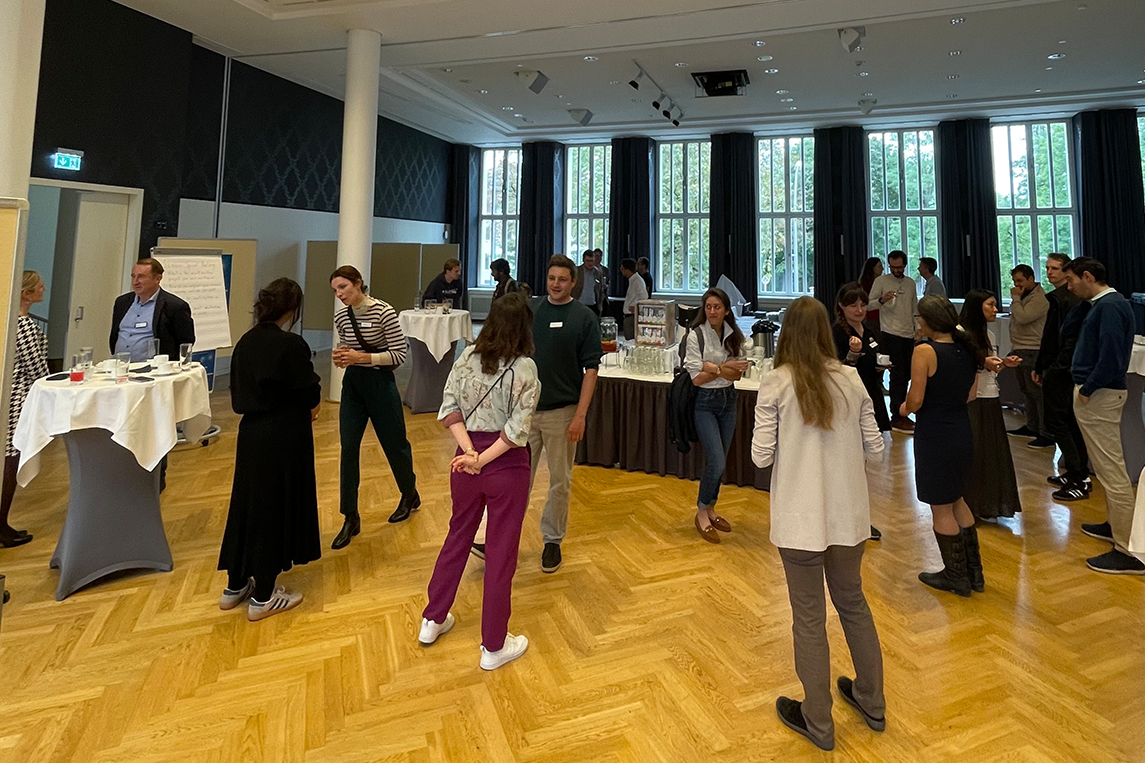
The symposium began with a warm welcome from the LeadNet Steering Committee. The first day offered a variety of exciting program points, including several notable lectures and a keynote speech by Gerd Gigerenzer from the MPI for Human Development. The highlight of the day was the Scientific Speed Dating, where research leaders were encouraged to network and exchange ideas about their projects and roles within the Max Planck Society.
On the second day, the MPDL led two workshops: The "Open Science" workshop aimed to inform participants about the principles and practices that make scientific research more accessible, transparent, and collaborative. The "AI-tools in science" workshop provided insights into the use of AI technologies to promote scientific discoveries and innovations.
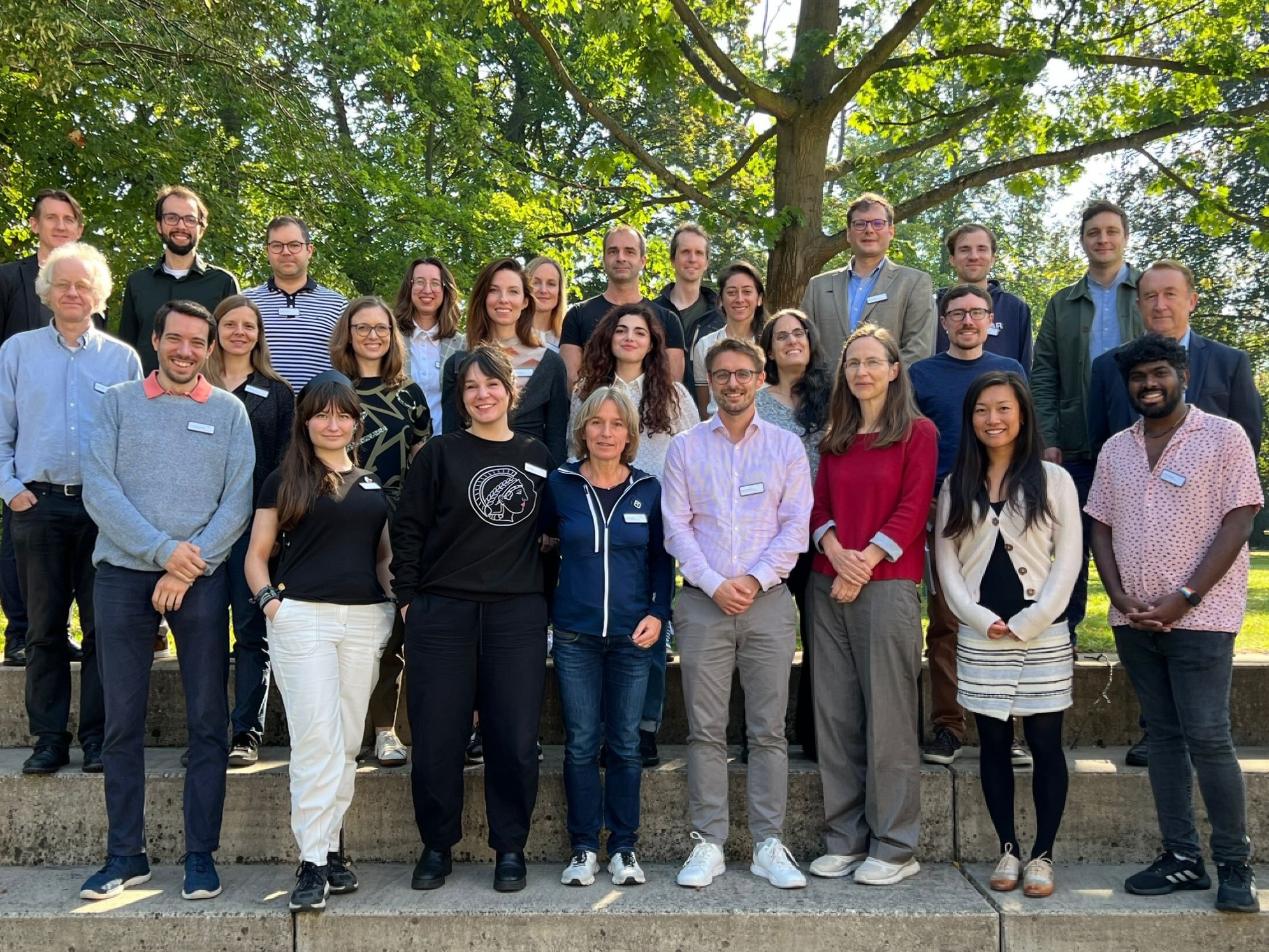
The event provided the ideal framework for discussing the scientific requirements and recent challengeges of research group leaders in more detail. The MPDL looks forward to being part of the next LeadNet Symposium again and continuing the exchange of knowledge with group leaders of the MPG.
More Info:
-
Open Science Summer School for Early Career Researchers
From September 9 to 13, 2024, the joint Open Science Summer School of the LMU Open Science Center and the Max Planck Digital Library took place in Munich.
The five-day event, which was aimed in particular at researchers at the beginning of their scientific careers, focused on the transparency, reproducibility and credibility of research.
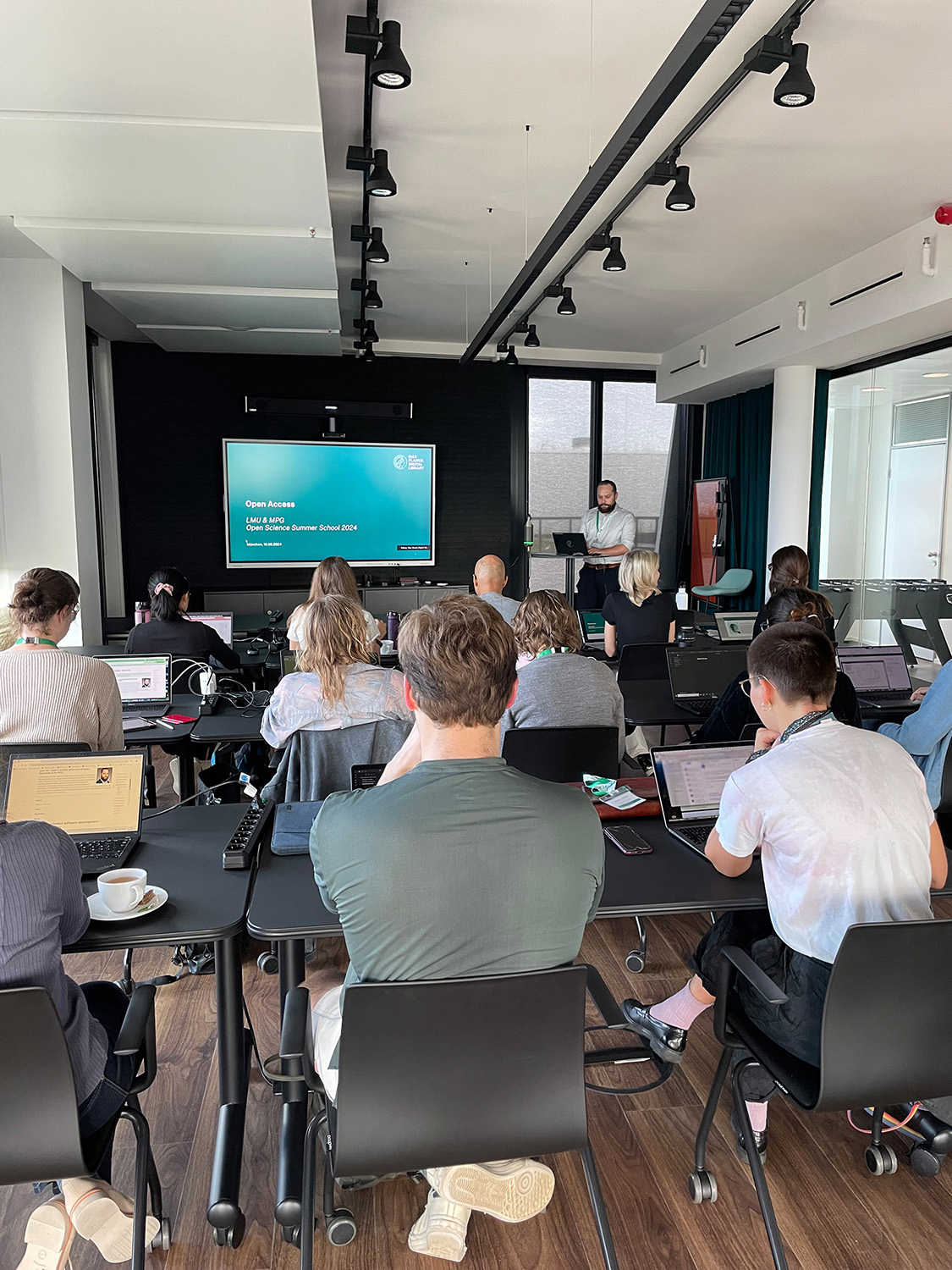
In his lecture “Science as amateur software development”, Professor Richard McElreath from the Max Planck Institute for Evolutionary Anthropology gave participants tips on how to incorporate insights from software development into their research work. In his sessions on the “reproducibility crisis” and “data sharing”, Professor Felix Schönbrodt from the LMU Open Science Center called for more transparency and openness during the research process. The motto was: “as open as possible, and as closed as necessary”.
One of the highlights of the Summer School was the panel discussion titled “Open Science incentives and institutional change”, which focused on how to create incentives to further integrate open science methods into the scientific community.
More than 100 young scientists had registered for the coveted places, 40 were selected and were able to participate – 20 in person and 20 online. Numerous lectures were open to the public online, with more than 450 participants from around the world registered to view them.
Materials from the Summer School, including recordings of the lectures, presentations and workshop documents.
More info:
Open Science in Practice Website
Open Science in Practice mailing list
-
New Funding Agreement between the Max Planck Digital Library and the publisher Mohr Siebeck
The Max Planck Digital Library has concluded a groundbreaking agreement with the renowned publisher Mohr Siebeck to ensure support for Open Access publications for scientists at the Max Planck Institutes. Under this agreement, the MPDL will cover the additional costs incurred by publishing in Open Access for monographs and edited volumes in which researchers from the Max Planck Society and its institutes are involved.
-
AI Tools in Science: Researchers Discuss Use Cases
June 17-18, 2024 | Munich: Over 50 Max Planck researchers from more than 20 Max Planck Institutes have met at the MPDL in Munich to discuss a broad range of AI-related topics regarding using AI tools in research.
In addition to researchers and support staff, the meet-up also counted the participation of representatives from the GWDG and the MPCDF, which, together with the MPDL, provide different AI services for the MPG.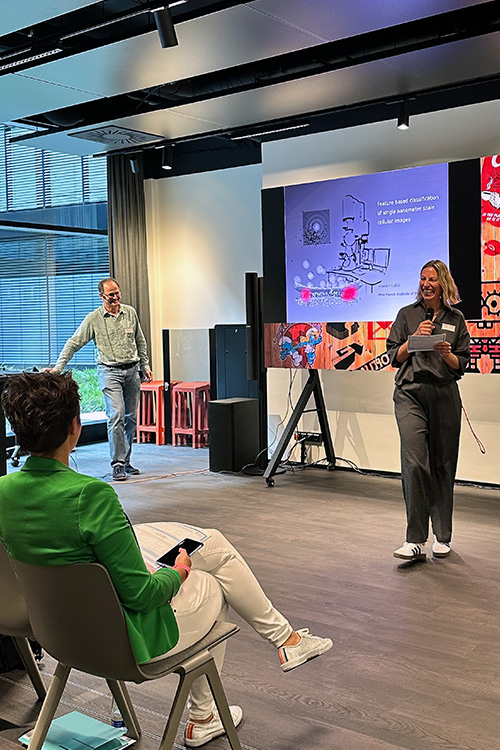
The objective of the meet-up was to create an instance of exchange and sharing of know-how of tools or processes that incorporate AI to accelerate research.
Researchers valued the opportunity to connect with other fellow Max Planck researchers who are early adopters of AI- tools in the context of research. A common worry researchers share is the fast pace of development and the arrival of new tools almost on a weekly basis, which can quickly become overwhelming. The lack of training on how to use AI for research, including best practices, was another point voiced by participants. Another realization of the meet-up was that several AI services are already being offered in the MPG via the MPDL, the GWDG, and the MPCDF, but most participants needed to be made aware of them.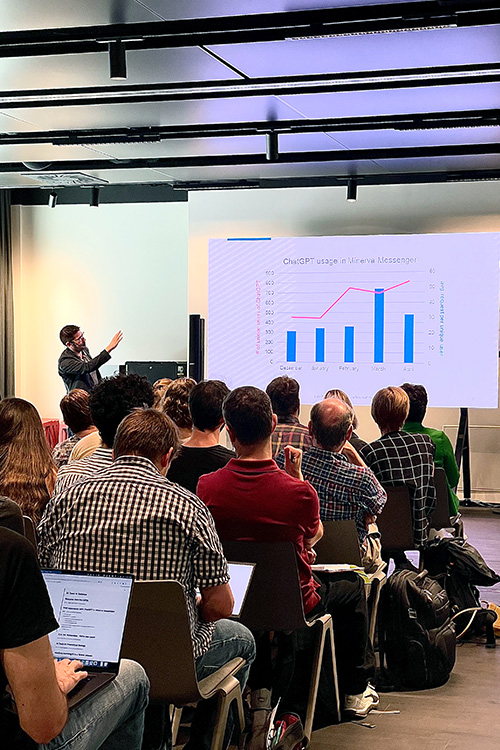
This was in contrast, for example, to the situation in the Fraunhofer Society, which developed a dedicated and centralized AI portal in 2023 called FhGenie and which was presented by Prof. Ingo Weber as an external guest at the meet-up.
The meet-up marks a significant step forward for the MPG in embracing and integrating AI tools into its research processes. Despite the challenges and rapid developments in AI technology, this gathering underscored the community's commitment to fostering collaboration, knowledge exchange, and the effective use of AI tools across the MPIs. By bringing together researchers, support staff, and representatives from key service providers like the GWDG, MPCDF, and the MPDL, the event highlighted the vast potential for AI to enhance research outcomes and efficiency. This event addressed current challenges and set the stage for a closer, more AI-knowledgeable research community within the MPG, envisioning a future where AI tools are naturally integrated into scientific work.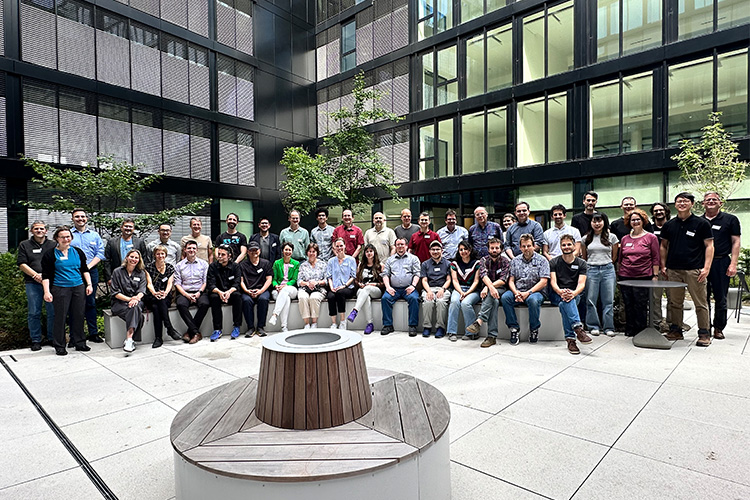
-
The Future of Protecting Intellectual Property: Blockchain Roundtable in Berlin
In a fruitful discussion at the 4th Blockchain Roundtable held at the Deutscher Bundestag, key figures from the legal and tech worlds came together, discussing “Code is Law? Adapting Our Legal System to Smart Contracts and Legal Tech”. The event, featuring Federal Minister of Justice Marco Buschmann and Member of Parliament Frank Schäffler, delved into how the German legal system can adapt to the rapidly evolving landscape of technology.
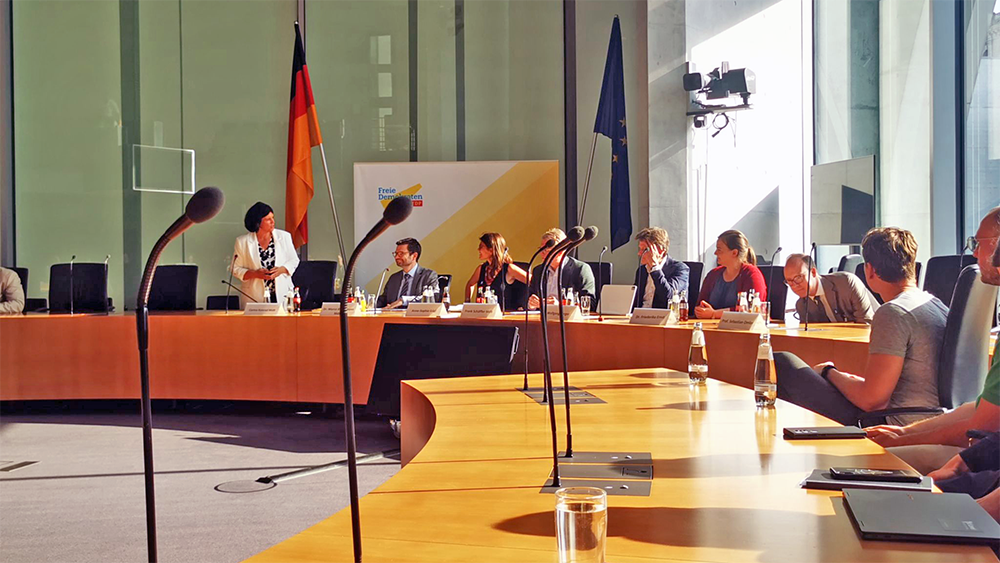
On behalf of the Max Planck Gesellschaft and the bloxberg Association for the Advancement of Science and Blockchain, MPDL’s Sandra Vengadasalam took part in the discussion.
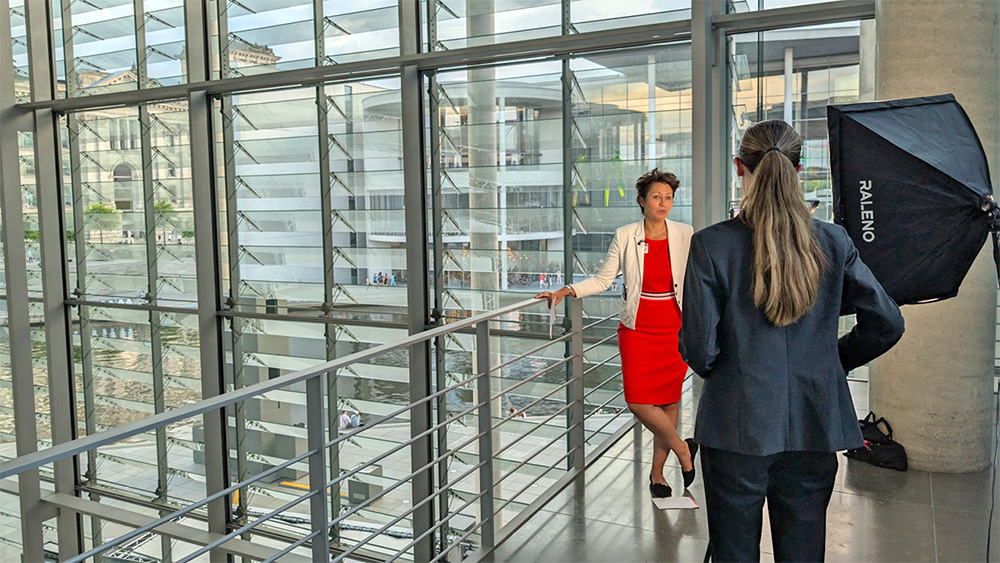
The roundtable was not just a high-level theoretical debate but also addressed practical concerns, particularly those of the bloxberg Association and the DeSci (Decentralized Science) community. Amongst the topics discussed were the bloxberg timestamps, also known as Research Object Certificates, and their legal standing in Germany, especially in the context of intellectual property (IP) protection.
The good news is that the German civil code (Bürgerliches Gesetzbuch, BGB) apparently is well-equipped to accommodate such innovative tools, suggesting that bloxberg certificates could play a crucial role in resolving IP disputes. This is a significant step forward for researchers and innovators looking for reliable ways to protect their work.
More Info:
bloxberg Association for the Advancement of Science and Blockchain
-
Max Planck Society subscribes to Opening the Future monograph programme at CEU Press
The MPDL has subscribed to CEU Press’s Opening the Future programme, providing all at Max Planck Society with unlimited and concurrent access to 100 different eBooks on subjects including Central and Eastern European history from medieval times to the fall of communism, and socio-political, economic and cultural changes, both past and present, across Central and Eastern Europe.
Read the full announcement here
-
MPG President Patrick Cramer visits MPDL
April 23, 2024, Munich – The Max Planck Digital Library (MPDL) was honored to host a visit from a distinguished delegation, including MPG President Patrick Cramer, Vice President Sibylle Günter, and General Secretary Simone Schwanitz. This visit underscores a significant milestone in the MPDL's journey, highlighting the critical role of our work within the Max Planck Society.
Throughout the day, the MPDL team had the opportunity to showcase our latest projects, achievements, and the innovative solutions we are developing to address contemporary challenges. The discussions with our guests were not only enlightening but also reflected a shared commitment to advancing research excellence.The visit from the leadership of the Max Planck Society is a testament to the MPDL's impactful work and its pivotal role in advancing digital research services and tools.The MPDL extends its heartfelt thanks to the delegation for their time and the encouragement provided to our team. This memorable day serves as a catalyst for future endeavors, reinforcing our dedication to excellence in research and innovation.
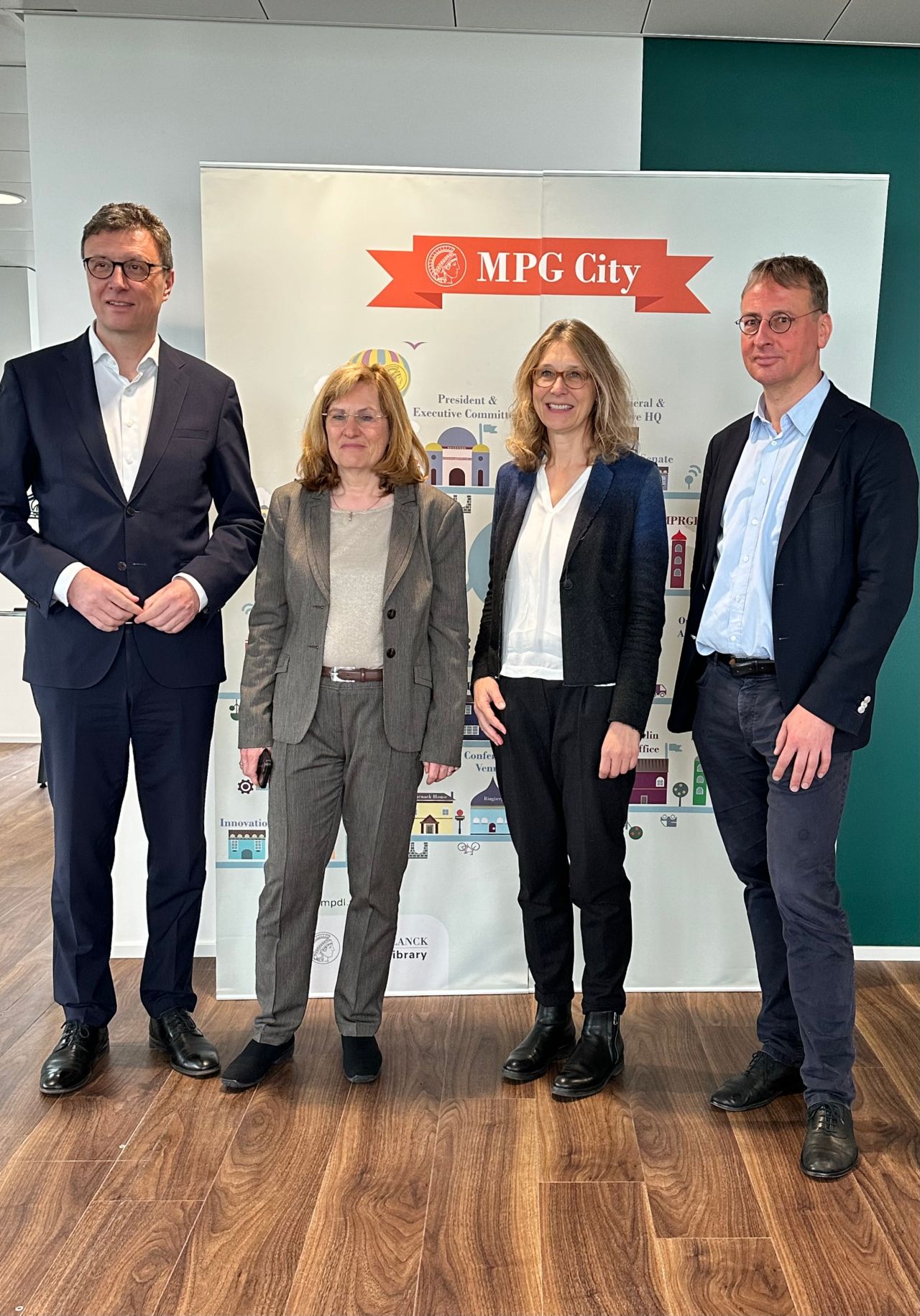
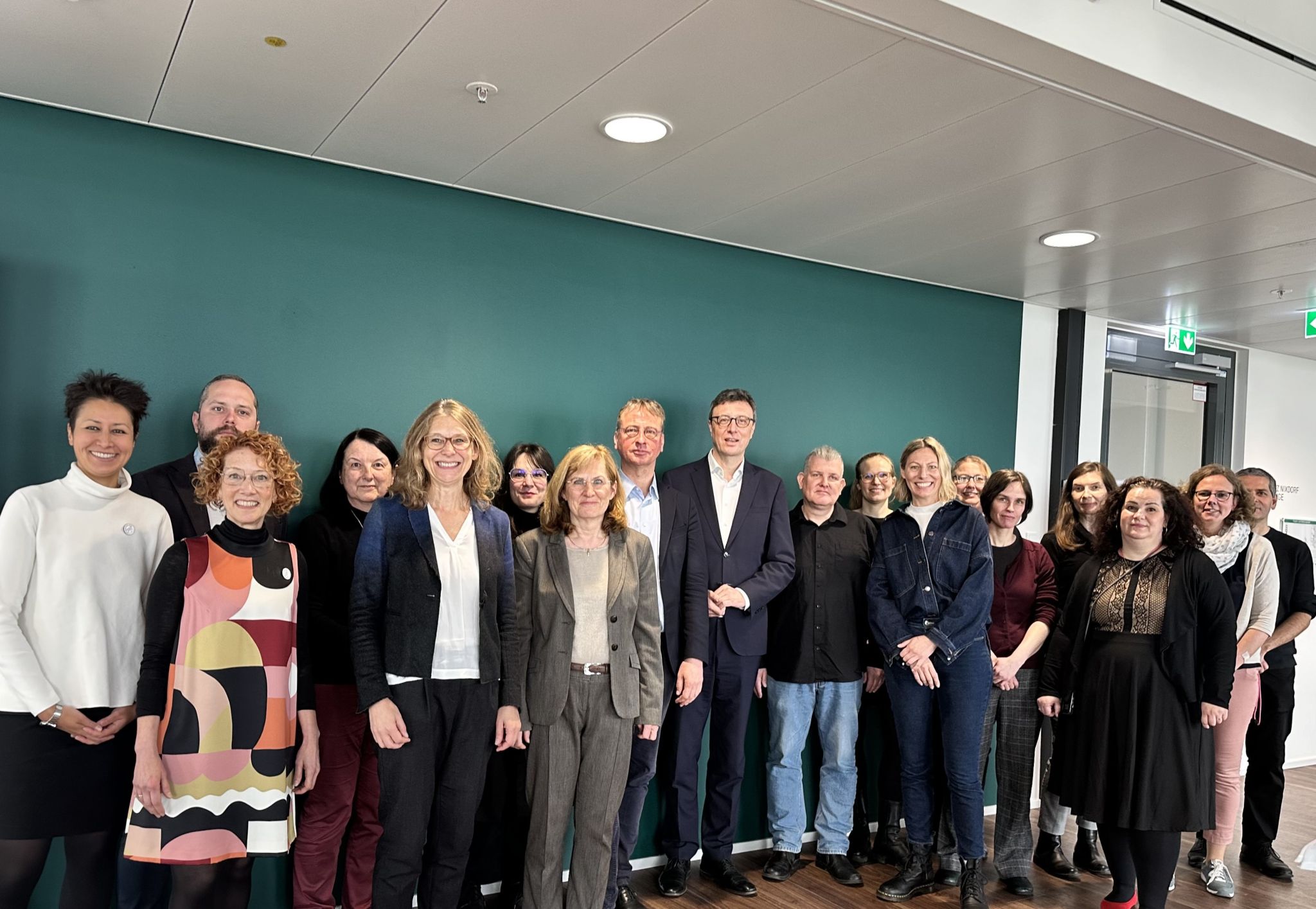
-
6th Research Data Management (RDM) workshop
From March 19-21, the Max Planck Digital Library (MPDL) hosted its 6th Research Data Management (RDM) workshop, at the Max Planck Institute for Astronomy (MPIA) in Heidelberg. This gathering united colleagues from Max Planck Institutes across Germany, creating a vibrant forum for the exchange of knowledge and experiences in RDM.
The workshop started with an onboarding course in Research Data Management, setting the stage for insightful discussions that followed. Over the next two days, participants explored RDM activities from various institutes, engaging deeply with topics such as software licensing, RDM policies, Electronic Lab Notebooks (ELNs), and data protection issues. Contributions from speakers representing the Fraunhofer Society, Leibniz Association, and Helmholtz Association broadened the discussions, offering diverse perspectives on the challenges and tools related to RDM.
A unique feature of this year's workshop was its venue - the planetarium within the House of Astronomy at the MPIA. This inspiring setting was not just a backdrop but a central part of the event, with a keynote talk on the use of Artificial Intelligence in Astronomy, a guided tour of the historical astronomical observatory, and engaging presentations at the planetarium.A big thank you to all the contributors, and the MPIA, for its invitation and organization that made this event a memorable experience. The collaborative spirit and shared insights have once again highlighted the workshop as a cornerstone event for fostering RDM practices within the Max Planck Society. The 6th RDM workshop has underscored the MPDL's commitment to advancing research data management within the Max Planck Society, emphasizing the importance of collaboration, knowledge sharing, and continuous learning in this evolving field.
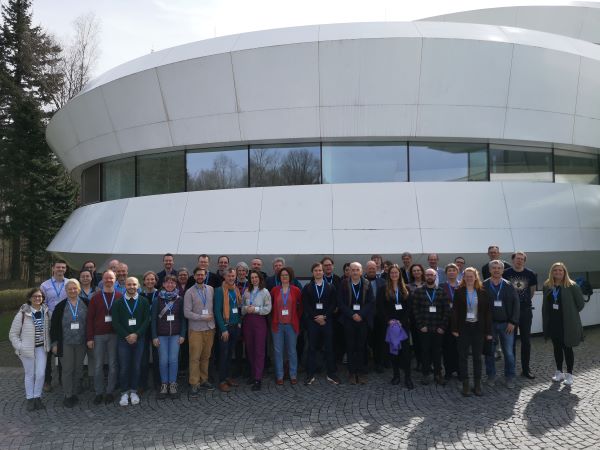
More info:
RDM Homepage -
MPDL's messaging service Minerva Messenger as a use case for Mattermost
At the core of the Max Planck Digital Library's mission, Minerva Messenger emerges, based on Mattermost: Born from the necessity of seamless collaboration during the unforeseen challenges of 2020, this platform has quickly become a valuable communication tool for the MPG.
Minerva Messenger was developed by MPDL's forward-thinking approach and the critical requirement for a secure, intuitive platform. This service not only facilitates effortless communication but also enables MPG researchers and their collaboration partners to share documents securely, manage projects through dedicated channels, and collaborate in real time, ensuring that innovation continues unabated.
Discover the whole story of how the service came to life and what features you get as an MPG researcher here.
More info:
Minerva Messenger Knowledge Base
-
Max Planck authors to continue to read and publish open access on Wiley and Springer Nature journals
The MPDL is pleased to announce its ongoing participation in the Germany-wide transformative open access agreements with Wiley and Springer Nature. On behalf of the Max Planck Society, the MPDL has again signed up for the two agreements, ensuring that Max Planck researchers can continue to publish their work open access at no cost to them, while also maintaining access to the publishers’ journal portfolios.
The opt-in agreements with two publishers were negotiated by the DEAL Konsortium, on behalf of the Alliance of Science Organizations in Germany. Having achieved the required institutional participation rates, the contracts are now officially in place, running from 1 January 2024 through 31 December 2028.
Read the announcement on the DEAL Konsortium webpage
More info
Information for authors (Wiley)
Information for authors (Springer Nature)
List of Wiley and Springer Nature journals on the MPG OA Journal Finder -
MPDL renews read and publish open access agreement with The Company of Biologists
The Max Planck Digital Library has renewed the read and publish agreement with The Company of Biologists. The agreement will run from 1 January 2024 until 31 December 2026, and corresponding authors at Max Planck Society’s 86 institutes can continue to publish research articles immediately Open Access (OA) in our hybrid journals (Development, Journal of Cell Science and Journal of Experimental Biology) and our fully Open Access journals (Disease Models & Mechanisms and Biology Open) without paying an article processing charge (APC). Researchers at participating institutions also benefit from unlimited access to our hybrid journals, including their full archives dating back to 1853.
“We at the MPDL are delighted to extend our collaboration with The Company of Biologists, which means we can continue to offer our researchers the possibility to publish open access in all the publisher’s journals as well as access to all previously published content," says Ádám Dér, Head of the Scientific Information Provision at MPDL. "Providing these opportunities to our authors is at the heart of our overall strategy in the world of scholarly publishing, in line with the Max Planck Society’s vision of openness, which in turn reflects the principles of the OA2020 Initiative and the Berlin Declaration on Open Access.”
Read the full announcement here
More info
Information for Max Planck authors
-
Open Science Days 2024 - Opening Science Together
The Open Science Days 2024 took place on January 29 -30. After the unfortunate news about the train workers union strike, the event switched to a virtual format. This did not hinder avid participation and exciting new discourses forming on all facets of Open Science. Two days of excellent presentations have left us with creatively racing thoughts.
It started right away with an all-around presentation by Open Science Coordinator Sünje Dallmeier-Tiessen from CERN. The Open Science Group there offers services at every imaginable level. Of particular interest here is the brand new Open Source Program Office, which even takes care of Open Hardware. After a long break, we had a contribution on the subject of Open Access. Our colleague Ádám Dér from the MPDL, who heads the Scientific Information Provision Department, gave us all an excellent overview of current developments in this area. Inga Ulusoy told us about the Scientific Software Center (SSC) at Heidelberg University. This central facility offers an incredible all-around carefree package in the field of Research Software for its scientists, which is undoubtedly unparalleled in this form in Germany. Reproducibility, which is always of central importance for Open Science, was covered in the vast European project Tier2. The ambitious plans were presented by Alexandra Bannach-Brown from the Berlin Institute of Health at Charité (BIH). The Face Game project at the MPI for Human Development combines several exciting aspects: this Citizen Science project is about humans' decision-making processes and artificial intelligence. All of this is strongly combined with game principles – science can be fun! We also delved into other topics, such as Open Science Monitors, Open Research Data, and Knowledge Graphs.
We would like to thank all the speakers and participants for this wonderful and active conference.
If you are interested in getting the whole insights into our Open Science Days 2024, you are welcome to check out the speaker presentations that will be gradually published on the Open Science Days homepage.
More info:
Open Science Days Website
Speaker Presentations here
-
Innovating Science - Digital Change Symposium 2023
The Digital Change 2023 symposium about the future of science management within the MPG took place at Seeon Monastery from 20th to 22nd November. The event, organized by the MPDL, brought together research coordinators, science communicators and experts to discuss science communication, the use of AI in science, research data management, open science and many other digital developments.
The symposium for MPG research coordinators took place for the first time under the new name "Digital Change". By focussing on innovations and trends relating to digital change, the MPDL aims to promote discussion and contribute to utilizing the opportunities of digital change for research and science. On a small island in the Seeon Lake, the Seeon Monastery provided the perfect atmosphere for the exchange of knowledge. The event was well received and highlighted the growing demand for the topics covered within the MPG.
More info:
-
UpVerse – a New Desktop Application for Edmond
We have developed a new desktop application for Edmond. UpVerse is a standalone application that you can install on your laptop. The application allows you to easily publish a lot of data and whole folder structures via click & drop to Edmond. Technically, it also works via the API interface. However, UpVerse has an attractive user interface so that it can be used without prior IT knowledge.
UpVerse is now online and works on Windows, Apple, and Linux. It is available to the Edmond/MPG community but also to the entire Dataverse community (Open Source Community). Additionally, you can find a tutorial and visual documents for easy handling on GitHub.
More Info:
UpVerse App here
Go to Edmond
-
Sixth bloxberg Summit: research institutions in Belgrade for transparent, efficient, and secure international collaboration in science
The sixth bloxberg Summit took place this year in Belgrade on October 26-27. The Summit was hosted by the Faculty of Organizational Sciences of the University of Belgrade in cooperation with the Max Planck Digital Library (MPDL). The expansion of the world's largest proof-of-authority network, operated exclusively by scientific institutions, was discussed. The technology, developed under the MPDL initiative and launched in 2019 with ten international universities, is a groundbreaking example of the application of blockchain in science. bloxberg acts as a pioneer for decentralized global infrastructure in the scientific field.
During the summit, Max Planck Society (MPG) was appointed Chair of the Board of the Association. It is represented by MPDL. For the very first time, the Summit was also opened to the general public on the second day. Under the theme "Blockchain Adaptation in Science," attendees had the opportunity to engage and network with prominent industry leaders such as Wolfram Alpha, Ethernity Cloud, ScieNFT, and other respected third parties.
For more detailed information, read the official bloxberg Association press release here.
-
Edmond now certified with CoreTrustSeal
The Open Research Data Repository Edmond received certification from the CoreTrustSeal Foundation in October 2023. The CoreTrustSeal is an internationally recognized award for digital repositories that meet the highest standards in research data management.
The certification confirms the repository's commitment to long-term data storage, data integrity, and openness. Edmond has thus demonstrated that it complies with international best practices for the management and provision of research data.
The award of the Core Trust Seal is an important recognition for Edmond and underlines its role as a trusted repository for high-quality research data. Researchers can now access Edmond's extensive database with even more confidence, publish their research data, and benefit from its high-quality content.
More info:
-
Max Planck Society joins Germany-wide open access publishing agreement with Elsevier
Following the announcement of the open access agreement between the DEAL Consortium and Elsevier last month, the Max Planck Society has now officially signed up as a participating institution, in a significant broadening of open access publication and reading options for Max Planck authors.
The agreement, which is in effect since 16 October, 2023 and runs through the end of 2028, allows authors across the Society to publish their research in Elsevier's journals—including well-known journal brands such as Cell Press and The Lancet—as Open Access articles under an open license retaining their copyright, with the publication fees being centrally covered by the Max Planck Digital Library. This comes in addition to the reestablishment of comprehensive reading access to virtually the entire Elsevier journal collection hosted on ScienceDirect.
DEAL-Elsevier agreement details
-
A new chapter and a new home for the MPDL!
Since October 2023 the MPDL has a new home! From now on we can be found at Landsberger Straße 346 in Munich. The move to the "MARK" building highlights the beginning of an exciting new chapter and creates new opportunities for the services of the MPDL, which are provided to the scientists of the Max Planck Society.
The building was constructed with environmental sustainability in mind and contributes to our commitment to a green future. By doing so, we are pleased to be able to contribute to the promotion of sustainable working environments in the scientific community.
MPDL employees were closely involved in the conception and design of the space and common areas. The result is a modern and inspiring work environment that also provides numerous opportunities to meet and exchange ideas to foster a forward-thinking and innovative work culture.
We warmly welcome all employees of the Max Planck Society to our new home in Munich-Laim!
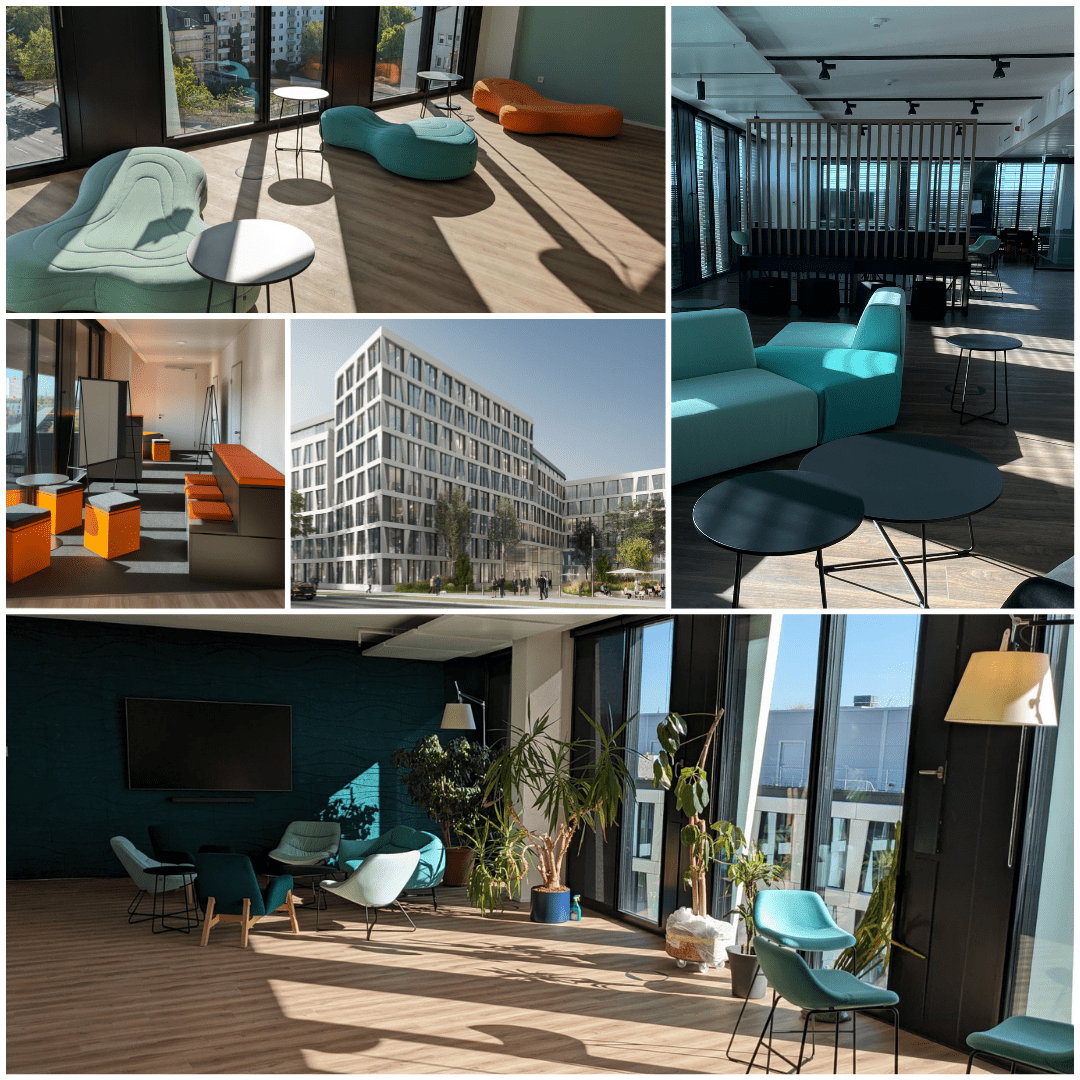
-
FAIR Principles for Research Software Become More Visible
The conscious use of research software is becoming increasingly important. The Max Planck Digital Library supports scientists in this. To this end, the MPDL has written an application for software management plans (SMP). It can be used to organize projects with research software in the open-source application RDMO. This application has now been revised and handed over to the RDMO community.
At the same time, the MPDL team has written an additional application to look at the own software according to the FAIR principles for research software (FAIR4RS). This complements the work with an SMP and enables scientists to check the FAIRness of their own code. In addition to quality management, this can, i.e. also be used for third-party funding applications.
More info:
RDMO for MPG hier
MPDL RDMO Support: This email address is being protected from spambots. You need JavaScript enabled to view it.
-
Open Access agreement between Projekt DEAL and Elsevier
Germany’s Projekt DEAL and Elsevier have entered into a new transformative agreement, in line with the objectives of the Open Access 2020 Initiative. The agreement has been officially announced earlier today.
Universities and research institutions in Germany are invited to sign up to the agreement.
Researchers will be able to publish Open Access in Elsevier journals under the DEAL agreement once their institution has joined the consortium. The agreement also grants reading rights for all Elsevier journal content to all participating institutions.
The consortium is organized by MPDL Services gGmbH, which will send the DEAL-eligible institutions (which include about 900 universities, universities of applied sciences, federal and state research institutions, etc.) the participation documents by the beginning of October.
The MPDL is organizing the participation of the entire Max Planck Society in DEAL and will now start preparing the next steps. We will update our websites with the relevant information as soon as it is available.
Information on the terms and conditions of the contract can be found on the DEAL Konsortium website and if you have any questions or comments, please contact us at This email address is being protected from spambots. You need JavaScript enabled to view it..
-
16th Berlin Open Access Conference outcomes now online
In early June, national-level delegations representing research communities from 38 countries across six continents gathered at the 16th Berlin Open Access Conference (B16).
Hosted by the Max Planck Society, initiator of the Berlin conference series, and organized by the Max Planck Digital Library’s Open Access 2020 Initiative (OA2020), the conference was held as a strategy meeting of global actors in research communication committed to advancing viable strategies to replace the subscription paywall model underlying the bulk of today’s scholarly journals with transparent and sustainable models that deliver immediate and open access to the results of research, enabling maximum scientific and societal impact.
B16 conference outcomes, including key insights to guide the research community’s next steps and final statement for publishers, are now available on the OA2020 website.
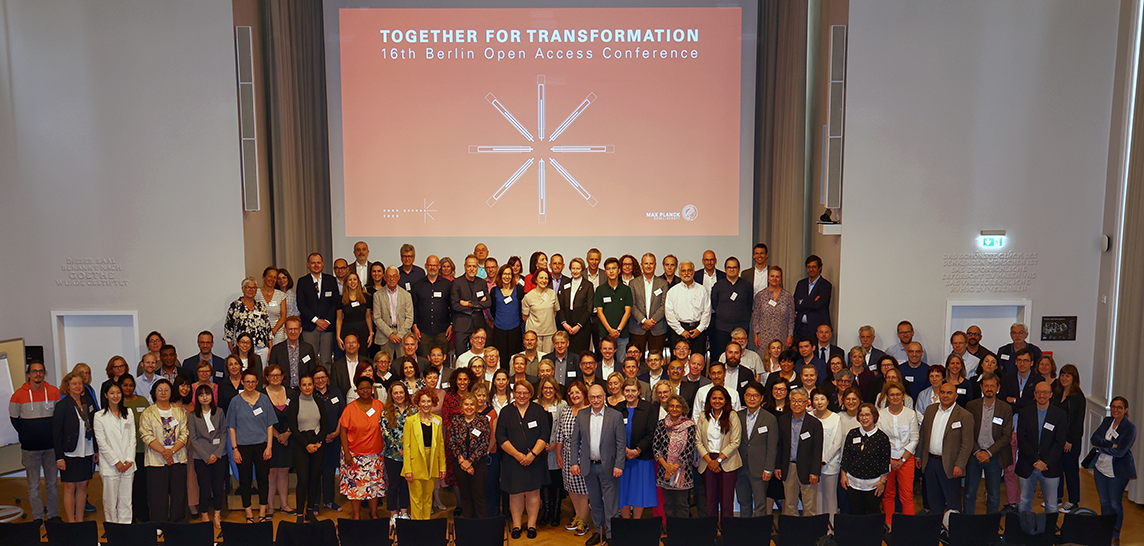 Participants of B16
Participants of B16Photo: © CC-BY-SA Georg Botz -
MPDL @ Festival of the Future
We are excited to have participated in the Festival of the Future at the renowned Deutsches Museum, showcasing the benefits of the bloxberg blockchain as one of the founding members. Our team successfully introduced bloxberg to diverse audiences, including universities, organizations, students, startups, and curious individuals. The response to our blockchain technology was overwhelmingly positive, highlighting the growing demand for decentralized science.
During this event, our deputy managers, provided valuable insights into how to blockchainify your data as well as the demand for decentralized science. This was also further discussed in a connected panel discussion on "DeSci Meets GovTech: Unlocking the Power of Blockchain".
Moreover, our team could attend numerous fascinating talks on AI, Life Sciences, Quantum Computing, New Space, Metaverse, Energy, Mobility, ClimateTech, Communications, and Web3. All discussions gave us valuable insights into cutting-edge technologies and their potential applications.
Overall, the Festival of the Future was an incredible platform for us to promote bloxberg, our work within the MPDL and connect with like-minded individuals, and contribute to the discourse on the future of technology. We are genuinely excited about the new connections forged and the new opportunities that have emerged.
More info:
News
Please find older news releases in our News Archive.










